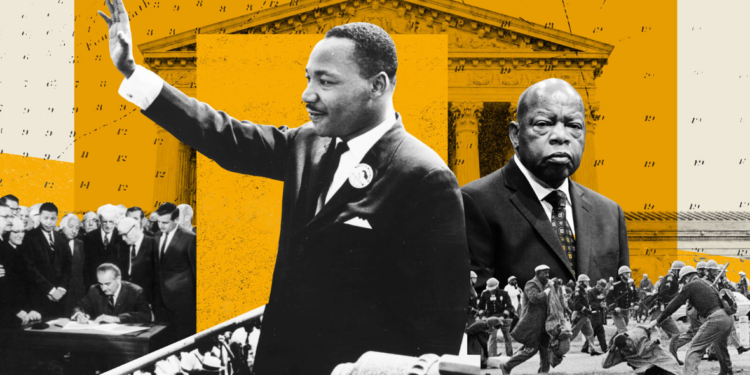March 9, 2025 Story by: Editor
“The Voting Rights Act of 1965 made it possible for people to access the simplest tool of democracy.”
That’s how Dr. Khalilah Brown-Dean, a political science professor at Wesleyan University and host of “Disrupted” on Connecticut Public, describes this historic legislation.
As the Voting Rights Act (VRA) marks its 60th anniversary this year—having been signed into law on August 6, 1965—its protections remain under threat, highlighting that the fight for voting rights in America continues.
A Landmark in Civil Rights Legislation
The VRA was introduced to dismantle systemic barriers that had long prevented Black Americans from exercising their right to vote. The struggle leading to its enactment was characterized by violent suppression, intimidation, and the relentless activism of civil rights leaders.
“You had Black veterans returning from fighting overseas,” Brown-Dean told Connecticut Public. “They came home and they couldn’t vote.”
This contradiction—serving in the military to defend democracy while being denied the right to participate in it—was one of the many injustices that fueled the demand for universal voting rights in the U.S.
Catalysts for Change
The 1960s witnessed a surge in activism, from sit-ins and boycotts to marches, all aimed at securing Black Americans’ right to vote. These efforts came at great personal risk, and in some cases, even cost lives.
Among those who made the ultimate sacrifice was Viola Liuzzo, a white Detroit mother who traveled to Alabama in 1965 to support the movement.
Liuzzo was transporting civil rights marchers between Montgomery and Selma when Ku Klux Klan members fatally shot her in her car.
“She wanted to be part of the movement for freedom,” Brown-Dean said.
Stories like Liuzzo’s, along with the violent attack on activists—including John Lewis—on the Edmund Pettus Bridge in Selma, underscored the urgent need for federal intervention. The result was the Voting Rights Act, designed to prevent racial discrimination in voting laws and practices.
A Transformative Impact
The passage of the VRA brought significant changes, particularly in the South, where literacy tests and poll taxes had long suppressed Black voters. Following its enactment, voter registration and participation among African Americans surged, paving the way for increased political representation.
“To have someone like John Lewis … go from being beaten on a bridge in Selma to then becoming a member of the United States House of Representatives, that would not have happened but for the intervention and the commitment of the VRA,” Brown-Dean said.
Modern Challenges to the VRA
Despite its groundbreaking impact, the VRA has been significantly weakened, particularly after the 2013 Supreme Court decision in Shelby County v. Holder. This ruling eliminated a key provision requiring jurisdictions with histories of voter suppression to obtain federal approval before changing voting laws.
“One of the biggest threats to the Voting Rights Act is the unwillingness to enforce its provisions,” Brown-Dean explained. “Having a preclearance provision … [meant] they had to have them pre-cleared with the Department of Justice.”
Without preclearance, states have implemented restrictions such as strict voter ID laws and voter roll purges—measures critics argue disproportionately affect minority communities.
The VRA’s Broader Impact
While the VRA is often associated with protecting Black voting rights, its influence extends beyond that.
“The Voting Rights Act of 1965 made it possible for people with visual impairments, for people for whom English is not their first language … [and] for indigenous people,” Brown-Dean said.
The legislation ensured ballots would be accessible to non-English speakers and individuals with disabilities, broadening democratic participation.
Hope for the Future
As some states continue to impose voting restrictions, advocates are calling for federal action to restore and reinforce the VRA’s protections.
“I am hopeful that Americans of good conscience will remember the importance of the history of the Voting Rights Act of 1965 and commit to ensuring its future,” Brown-Dean said.
For her, the right to vote is fundamental to America’s identity.
“A commitment to voting rights is not partisan,” she emphasized. “But it is about moving our country closer to her promise and to the ideals of democracy.”
Source: CT Public

















